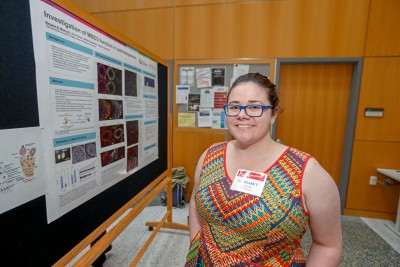Abstract
Investigation of MBD3 Function in Spermatogenesis
 Student: Margaret Michicich
Student: Margaret Michicich
Faculty Mentor: Satoshi Namekawa (Cincinnati Children’s Hospital Meidcal Center (CCHMC) Department of Reproductive Sciences
MBD3 is a protein in the NuRD complex which alters DNA packaging. A mutant mouse line with an Mbd3 deletion in the male germline (cells involved in forming sperm) was created. Mutant testes and epididymides were extracted and dyed to locate the NuRD complex proteins in different cells. I characterized the wild type and mutant samples for three NuRD complex proteins and described their accumulation in the testes to try to understand the role of MBD3 in forming sperm.
Epigenetic changes in the germline can affect fertility. The function of Methyl CpG Binding Domain Protein 3 (MBD3) was studied to elucidate how epigenetic machinery regulates germline development. MBD3 is part of the Nucleosome Remodeling and Deacetylase (NuRD) complex which remodels and deacetylates histones. To determine the role of MBD3 in mouse spermatogenesis, we conditionally deleted the Mbd3 gene using Cre-LoxP-mediated recombination in germ cells. The Vasa-Cre ERT2 transgene with Cre-mediated recombination can be expressed in germ cells under the control of a germline-specific, tamoxifen sensitive, Vasa promoter. Chromosomal spreads of spermatocytes and tissue sections of testes and epididymides were examined. MBD3 localization was examined in the germ cells of Mbd3-cKO mice to confirm depletion. However, testes stainings showed apparent MBD3 signal. This may be explained by stem cells escaping the inducible deletion and repopulating the testes with Mbd3 positive cells. Another possible explanation is that the MBD3 antibody used was non-specific, binding to other isoforms of MBD3 or other MBD containing proteins. The localization of CHD4 and MTA1, other NuRD components, were examined. The localization of CHD4 and MTA1 showed no difference between the mutants and controls. Additionally, prophase I of meiosis progressed normally and all expected cell types were present. Interestingly, mutant testes were significantly larger than the control. With regard to fertility, a cross between Mbd3-cKO and wild type mice did not transmit the deleted Mbd3 allele to offspring, suggesting a link between MBD3 depletion and infertility. The difficulties with the model prevent definite conclusions from three biological replicates. However, it appears that there is normal meiosis progression in the Mbd3-cKO testes. The differences between the controls and mutants must be studied further.
